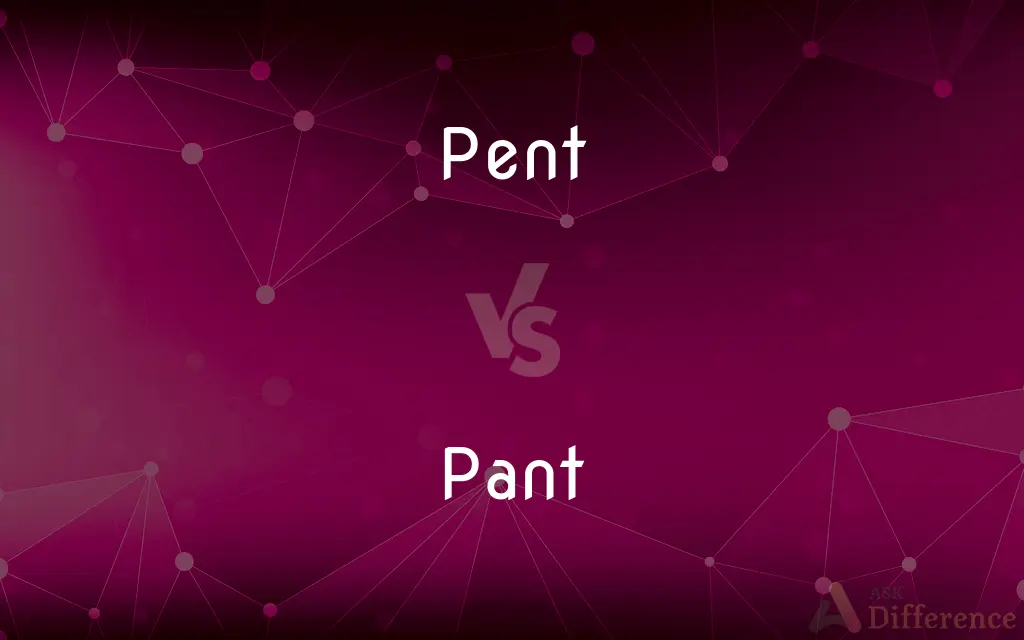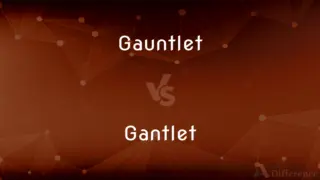Pent vs. Pant — What's the Difference?
Edited by Tayyaba Rehman — By Maham Liaqat — Updated on April 5, 2024
Pent is often used to describe feelings or energy being confined, while pant refers to short, quick breaths, typically from exertion or heat.

Difference Between Pent and Pant
Table of Contents
ADVERTISEMENT
Key Differences
Pent, a less commonly used term, often relates to emotions or forces that are confined or suppressed. Whereas pant describes the act of breathing rapidly and shallowly, usually as a result of physical exertion or heat.
The use of "pent" is frequently seen in literary or expressive contexts, indicating a build-up of feelings or energy. On the other hand, "pant" is commonly used in everyday language to describe the physical state of breathing heavily.
"Pent-up" is a popular phrase derived from "pent," illustrating the concept of emotions or pressure that have been contained for a long time. Meanwhile, "panting" is the gerund form of "pant," often used to depict animals or humans in a state of heavy breathing.
The adjective "pent" can also be used in architectural or design contexts, referring to a space that is closely confined. In contrast, "pant" does not have a common usage outside of its verb form related to breathing.
While "pent" suggests a state of being that might lead to eventual release or explosion of suppressed emotions or energy, "pant" specifically deals with the physical act and its immediate causes, such as running or high temperatures, with no implication of a future release.
ADVERTISEMENT
Comparison Chart
Definition
Describes something confined or suppressed.
Refers to quick, shallow breaths.
Context
Literary, emotional, design.
Physical exertion, heat.
Common Phrases
"Pent-up" emotions.
"Panting" for breath.
Usage
Adjective, rarely as a verb.
Primarily used as a verb.
Implication
Potential future release or explosion.
Immediate physical response to exertion or environment.
Compare with Definitions
Pent
Suppressed Energy.
The pent energy in the room was palpable before the announcement.
Pant
Desire Expression.
He panted for a chance to prove himself.
Pent
Confined Emotions.
He felt pent frustration after years of silence.
Pant
Rapid Breathing.
After the race, he was panting heavily.
Pent
Architectural Confinement.
The pent roof allowed for no extra space.
Pant
Exertion Response.
The dog panted in the heat after playing.
Pent
Contained Force.
The pent-up water pressure finally burst the pipe.
Pant
Heat Reaction.
The athletes were panting in the sweltering summer sun.
Pent
Emotional Build-up.
Years of pent grievances erupted in a heated argument.
Pant
Physical State.
Panting, she reached the mountain's summit.
Pent
A past tense and a past participle of pen2.
Pant
To breathe rapidly in short gasps, as after exertion.
Pent
Penned or shut up; closely confined.
Pant
To beat loudly or heavily; throb or pulsate.
Pent
Confinement; concealment.
Pant
To give off loud puffs, especially while moving.
Pent
A pentatonic scale.
Pant
To long demonstratively; yearn
Was panting for a chance to play.
Pent
A pentacle or pentagram.
Pant
To utter hurriedly or breathlessly
I panted my congratulations to the winner of the race.
Pent
Confined in, or as if in, a pen; imprisoned.
Pant
A short labored breath; a gasp.
Pent
(archaic) pen; penned
Pant
A throb; a pulsation.
Pent
Penned or shut up; confined; - often with up.
Here in the body pent.
No pent-up Utica contracts your powers.
Pant
A short loud puff, as of steam from an engine.
Pent
Closely confined
Pant
An outer garment that covers the body below the waist, usually to the ankles, and is divided into sections to fit each leg separately
She decided to wear pants instead of a skirt. He bought a new pair of pants.
Pant
Underpants.
Pant
A quick breathing; a catching of the breath; a gasp: the panting of animals such as a dog with their tong hung out- as a form of thermoregulation.
Pant
(figurative) Eager longing.
Pant
(obsolete) A violent palpitation of the heart.
Pant
(fashion) A pair of pants trousers or underpants.
Pant
(used attributively as a modifier) Of or relating to pants.
Pant leg
Pant
Any public drinking fountain.
Pant
(intransitive) To long eagerly; to desire earnestly.
Pant
To long for (something); to be eager for (something).
Pant
(intransitive) Of the heart, to beat with unnatural violence or rapidity; to palpitate.
Pant
(intransitive) To sigh; to flutter; to languish.
Pant
(intransitive) To bulge and shrink successively, of iron hulls, etc.
Pant
To long eagerly; to desire earnestly; - often used with for or after.
As the hart panteth after the water brooks.
Who pants for glory finds but short repose.
Pant
To beat with unnatural violence or rapidity; to palpitate, or throb; - said of the heart.
Pant
To sigh; to flutter; to languish.
The whispering breezePants on the leaves, and dies upon the trees.
Pant
To breathe forth quickly or in a labored manner; to gasp out.
There is a cavern where my spiritWas panted forth in anguish.
Pant
To long for; to be eager after.
Then shall our hearts pant thee.
Pant
A quick breathing; a catching of the breath; a gasp.
Pant
A violent palpitation of the heart.
Pant
A single leg of a pair of pants. See pants.
Pant
Of or pertaining to pants.
Pant
The noise made by a short puff of steam (as from an engine)
Pant
A short labored intake of breath with the mouth open;
She gave a gasp and fainted
Pant
Breathe noisily, as when one is exhausted;
The runners reached the finish line, panting heavily
Pant
Utter while panting, as if out of breath
Common Curiosities
Can "pant" have different meanings?
While "pant" primarily describes breathing, it can metaphorically express a strong desire for something.
What does "pent" mean?
"Pent" refers to emotions, energy, or something else being confined or suppressed.
What does "pant" mean?
"Pant" means to take short, quick breaths, typically as a result of exertion or being in a hot environment.
What can cause "pent-up" feelings?
"Pent-up" feelings can be caused by long periods of suppression or not expressing emotions or energy.
Is there a physical aspect to "pent"?
"Pent" usually refers to non-physical aspects like emotions or energy, though it can describe physical confinement in certain contexts.
How is "pent" commonly used?
"Pent" is often used with "up" to describe emotions or forces that have been held back or contained.
What is the difference between "pent-up" and "panting"?
"Pent-up" describes suppressed emotions or energy, while "panting" refers to the act of breathing heavily due to physical exertion or heat.
Why do people pant?
People pant as a natural response to increased bodily demand for oxygen during exertion or to cool down in hot conditions.
Is "panting" always due to exertion?
No, panting can also be caused by heat, stress, or medical conditions.
Is "pent" used in modern language?
"Pent" is less commonly used in everyday speech but is found in literary and expressive contexts.
Can emotions be described as "panting"?
Emotions are not typically described as "panting," which is more associated with physical states of breathing.
Can "pent" feelings be harmful?
Yes, pent feelings can lead to stress, anxiety, and even physical health issues if not addressed.
How do you release "pent-up" emotions?
"Pent-up" emotions can be released through talking, therapy, physical activity, or creative expression.
How does "panting" help the body?
"Panting" helps the body regulate temperature and increase oxygen intake during physical activities.
What signifies "panting" in animals?
In animals, "panting" is a sign of exertion, heat stress, or sometimes illness.
Share Your Discovery

Previous Comparison
Gauntlet vs. Gantlet
Next Comparison
Rebuke vs. ScoldAuthor Spotlight
Written by
Maham LiaqatEdited by
Tayyaba RehmanTayyaba Rehman is a distinguished writer, currently serving as a primary contributor to askdifference.com. As a researcher in semantics and etymology, Tayyaba's passion for the complexity of languages and their distinctions has found a perfect home on the platform. Tayyaba delves into the intricacies of language, distinguishing between commonly confused words and phrases, thereby providing clarity for readers worldwide.














































